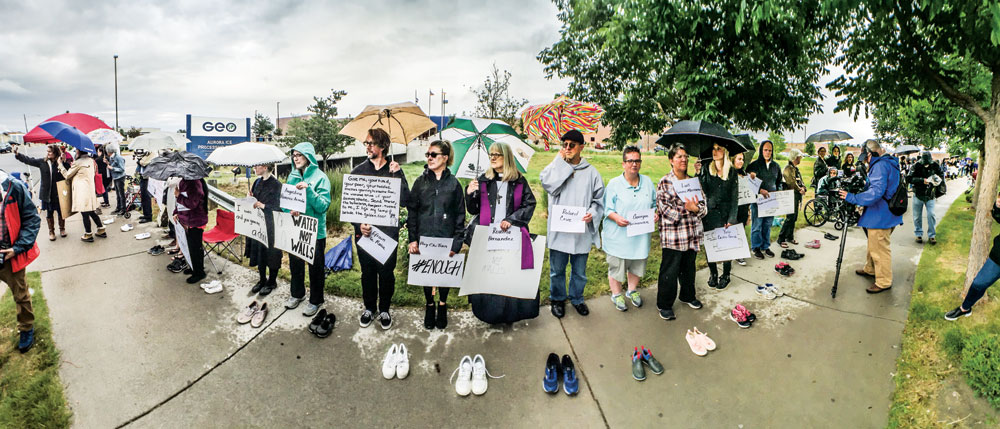
Hundreds of individuals asked to dress in black and white demonstrate outside of the GEO detention center on June 21, part of a national day of action protesting the Trump administration’s treatment of immigrants and refugees. The shoes represent those who have died in detention and while attempting to cross the Sonoran desert that straddles a section of the U.S.-Mexico border.
For more, click on the Front Porch story Casa de Paz: A Helping Hand for Detainees
Frustration with Congress’ longstanding failure to pass comprehensive immigration reform is mounting across the country and in our own community.
Community Responses
“What would it be like to have to leave your home, where your family is, and take everything with you, knowing you might not survive? Why would you do that willingly?” Park Hill’s Nancy Johnson reflects on her family history of migration when she addresses the present crisis—her Irish ancestors arrived in Denver in the 1860s. She says when she learned of the federal government’s treatment of immigrants in 2015, she and her husband began volunteering at Casa de Paz to make an impact locally.
The Metro Denver Sanctuary Coalition, a coalition of 12 religious congregations and the American Friends Service Committee, started organizing during the Obama administration, when deportations began to rise. In 2014, First Unitarian Society of Denver (FUSD) became the first Colorado faith community to offer sanctuary to prevent an individual’s deportation. Today, Jeanette Vizguerra, a national figure in the immigration reform movement, lives in sanctuary at FUSD. FUSD’s Rev. Mike Morran, a Stapleton resident, says, “If you have eaten food or stayed in a hotel or…[engaged in] any number of other economic activities, these people are already part of your community. There is no us and them.”
Ellen Graham, who hosts a political podcast and serves as communications director for the Denver Republican Party, has a very different response, repeating President Trump’s calls for a wall along the southern border. She believes people should stay in their home countries and reform or overthrow their corrupt systems of government. “If you look at them you think, ‘Oh these poor people’…but they couldn’t get their own act together in their own country and do their own thing.”
Those who differ with this view have come together to protest the jailing of asylum-seekers in particular. They have broken no laws and must be on U.S. soil to petition for asylum. In July, Lights for Liberty organized a candlelight vigil at Aurora’s detention center run by The GEO Group, a company that owns multiple private detention facilities. Close to 2,000 people gathered peacefully; a small minority, however, garnered negative national attention after raising a Mexican flag on the GEO flagpole and setting a U.S. flag on fire. Protesters, who were dispersed by police an hour before the vigil was to end, expressed dismay that a fringe group had not only derailed the event but also distracted media attention from the substance of their concerns—among them, human rights violations in detention centers.
Congressional (In)Action and Reform
Though community members offer differing views on the current immigration crisis, there seems to be agreement on the need for a pro-active approach from Congress, though views differ on what the focus of a policy should be: to address U.S. labor needs, provide a haven for those seeking refuge, or construct a wall.
GEO sits in Rep. Jason Crow’s district (CO-06), and he has been intent on holding ICE and GEO accountable for their treatment of detainees. In a July 8 statement, Crow called for the abolition of private, for-profit immigration detention centers: “We have an immigration detention system that is driven by corporate greed. This system has allowed corporations like GEO Group to cut corners on necessary medical care and safety to benefit their bottom line. It is not enough to demand transparency, we must demand accountability.” Crow and his staff in June began weekly inspections of GEO, using ICE’s own standards as a guide. An Inspector General’s report earlier this year cited this facility as falling short of those standards on numerous counts. At Crow’s July 22 inspection, he brought Colorado’s Congressional Reps. DeGette, Perlmutter and Neguse.
In the June presidential debate, Colorado’s Sen. Michael Bennet (D-CO) pointed out that the last time Congress came close to passing meaningful immigration legislation was in 2013. Bennet was part of the “Gang of Eight,” a bipartisan group of lawmakers who passed the Border Security, Economic Opportunity and Immigration Modernization Act in the Senate. Rep. Diana DeGette (D-CO) co-sponsored the bill in the House of Representatives, but the measure was never brought up for a vote by then Speaker of the House John Boehner (R-OH).
Rep. Jason Crow co-sponsored the Dream and Promise Act, which offers a path to citizenship for immigrant youth and those with Temporary Protected Status (TPS) or Deferred Enforced Departure (DED) status. Thousands of Coloradans (and people throughout the country) who are living in legal limbo under these statuses would benefit from this bill that passed the House on June 4, 2019. If present patterns hold, however, it’s not likely to even be given a vote in the Senate.
There Is Only Us
Rev. Morran says, “Offering sanctuary, attending protests, writing letters, helping asylum seekers, ministering to scared and traumatized families, visiting elected officials and getting out the vote is about much more than helping individuals or individual families. For me, part of the reason for doing sanctuary and all those other things is to do it publicly, very publicly, to put real faces, real people, real stories in people’s minds, so we can put pressure on Congress to do its damn job and relieve the suffering….There is only us. All of us. And the fate of the immigrant community, which you are already a part of, is the fate of us all.”



0 Comments